The Irving Way
Personal reflections on the lives of the late Sue Stultz, and Arthur Irving
Like a lot of people of people who grew up at least partly in New Brunswick, the moniker “no-funswick” was often kicked around. Some even said that the best thing about the province was the (eventually) twinned highways running nearly the length of it, so you could get in and out more quickly.
Now, I’m not a pure born Pollyanna or a chew-the-arse-off-it critic, I live somewhere in the middle. I’m at least a little in thrall to the idea that your hometown(s) are among your first true loves, and also aware that for many folks they can be claustrophobic, or worse.
For me, Moncton, New Brunswick, in the early 1990s was closer to fine than it was to awful.
Like many people, my first job was working for one arm of the Irving family – I had a paper route. I learned one key thing from that job: I didn’t really like to get up that early.
So I handed that job to the next unsuspecting sucker, and got my first real job also working for the Irving’s - this time for another arm of the family - at the St. George Boulevard Irving station in Moncton, owned by the indomitable Sue Stultz – who died of cancer last month.
I frequented her store on lunch hours from my junior high next door, so one day I screwed-up the courage and went over and asked her for a job.
Maybe this is the way it happened, or maybe this is how I remember it - but it went something like this:
She inquired what Grade I was in, and when I told her grade nine, she said they didn’t generally hire folks that young; had I thought of a paper route?
I looked at her and said “I’ve done the paper route - I want to work here. I’ll work hard, and I won’t let you down.” She took a beat, narrowed her eyes seriously, considering me and said “Ok, be sure you don’t, then.”
I was hired as a part-time ‘gas bar attendant’.
Sue’s reputation preceded her - she didn’t suffer fools, and was generous to a fault.
Working for Sue meant that I knew of the legendary late Arthur Irving – who also died of cancer, last week – long before I came to actually know him.
Sue was justifiably proud of her business, earning the top Irving star rating - or whatever exactly it was called - every year. Somehow, after all the training and mentorship I’d had in my first six weeks on the job - including from a lovely middle-aged man, who’d worked with Sue for 10+ years - I managed to put her in a position to lose that vaunted status.
One day in early August a ‘secret shopper’ caught me at peak teenager – I was day-dreaming of a party at the RV campground in Caissie Cape, singing along to Whitesnake, in my head. I’m sure I was awkardly tapping my foot to the imaginary music and fully zoned-out.
As I juggled a few other customers, I looked over and wondered to myself why this customer parked their car and wandered inside, after I’d already pumped their gas.
A few minutes later Sue called me upstairs.
She made me go step-by-step with her through what I should have asked/offered and done for this customer, who was still lingering downstairs in the store. When I hesitated on 3 of the 6 steps, she looked genuinely distressed. “This just might lose me the rating for this year.” She was brooding, as I’d never seen her before. As I left to go home at the end of my shift I asked her if she would actually lose the rating, or was just trying to teach me a lesson. “I don’t honestly know – I guess I’ll have to speak to Mr. Irving and see if I can salvage it.”
Suffice to say I didn’t miss a step for the rest of the Summer. And while she checked in on me regularly, it wasn’t shame-based or stern.
I’ve no idea whether she spoke directly to Arthur (reports of him personally stopping by stations to check in on things did surface regularly, hard to tell if it was just lore; anyone who knows the Irving’s gas station chain knows that clean washrooms are one promise they’re maniacally committed to), but somehow she managed to save her rating.
Sue even kept open an offer to hire me back the next Summer; I chose camp counsellor instead, and she gave me a glowing reference letter, noting something along the lines that I “learned from my mistakes”. I was asked about that phrase in my camp interview, and I told them the story - they hired me anyway.
A few years later I was heavy into student politics at Acadia University, and the search for a new Chancellor was underway.

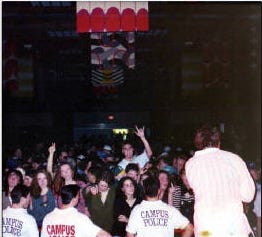
The possibility of appointing Arthur Irving was greeted by some students – and many Academics – as a bridge too far into the melding of ‘the corporate’ with the ‘academy’; as an earnest student politician, I dutifully and passionately represented this viewpoint.
Still, I had a lingering misgiving that he must be fair-minded – if in fact Sue had spoken to him to maintain her status and star rating five years earlier, over the mistakes of a 15 year-old novice.
Arthur - for he preferred to be called that rather than “Mr. Irving”, which is not a trait shared by some other senior Irving family members I’ve come to know - was appointed, and served as Acadia’s Chancellor from 1996 to 2010; the longest-serving Chancellor in the University’s history.
I remember meeting Arthur and his wife Sandra for the first time – apprehensive that my prior advocacy might cause a bit of a frisson.
They were both – and to be clear, they were a package deal in every way – warm and engaging, curious about me, about student life and completely without airs. Arthur asked where I was from, and when I said my family lived in Moncton, and that I had worked for Sue Stultz, he beamed about her. He went up and down naming people who worked with or for the Irving’s in Moncton, to see if I knew them. I swear he knew the name of most of the folks who drove Irving Oil delivery trucks, not just managers or ‘higher-ups’.
I’d never met a billionaire before, but this wasn’t what I expected.
I’m not sure the University community knew what to expect during that first convocation, either – Universities have a sometimes well-deserved reputation for stuffiness; and ‘stuffy’, Arthur was not.
He spoke without notes, his body animating his exhortations to the grads (“Call your mother!; Always give your best; Remember Acadia”). Sermonize, he did not. Energize, he did.
Over the next few years at convocations, and university events, Arthur and Sandra were solicitous and engaged – I got hand-written birthday cards from them in those years, occurring as it generally did in tandem with convocation.
As the worm turned on Dr. Kelvin Ogilvie’s polarizing efforts as President, I was increasingly critical of the administration – and his leadership in particular, calling for his resignation on a few occasions. Kelvin, whose reputation as a bully preceded him, treated me in-kind and often ignored me during official events over the next couple of years.
Arthur and Sandra managed the obvious tension well, and would always check in, and ask after my family – who had recently all moved across the country to B.C., and how I was doing having them “so far away”.
When I crossed the stage to graduate in 2000, President Ogilvie’s visible disdain for me was palpable, I remember it well. Arthur, on the other hand, gave me a warm pat on the forearm and looked me in the eye: “you’ll do well young fella, I just know it; good luck.”
I didn’t see them much over the next dozen years as I went to Manitoba to work for Premier Gary Doer, and then came back to NS to start a family and wrap myself up in the provincial politics of Nova Scotia. I joined the government of Premier Darrell Dexter in 2009.
Next door, Sue Stultz managed to channel her desire to make things better for people into getting elected to the New Brunswick Legislature and was sworn-in to the Cabinet. I had watched her political foray with interest, but didn’t see her often – my parents’ move to B.C. having somewhat severed my Moncton connection.
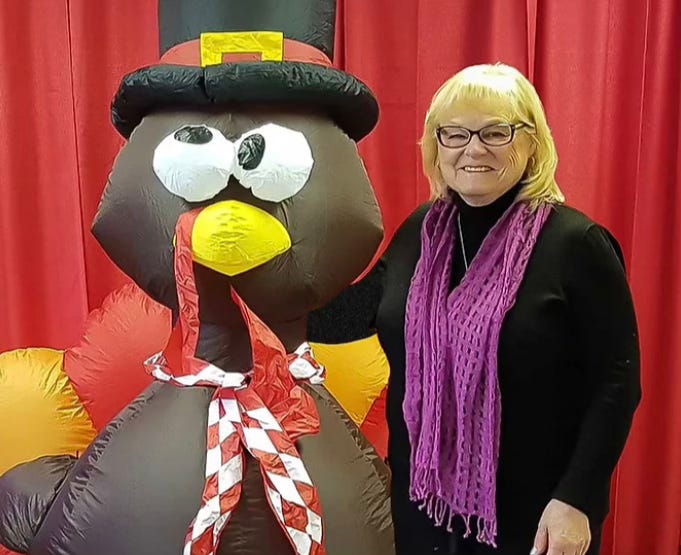
I sent her a congratulatory email. A short while later she called the Premier’s office in Nova Scotia and asked to be put through to me.
“Paul, it’s Sue. How are your parents doing? People sure miss your dad at the Moncton Hospital,” she said. After a brief bit of introductory catch-up, she continued, “Look as you know I’ve gone and gotten myself elected, and now I’m Minister of Social Development – I figure you know a thing or two about politics, and I don’t – what advice have you got for me?”
I was surprised – I worked for an NDP Premier, and she with a Progressive Conservative government. The old Irving motto seemed to have rubbed-off on her – “Anything worth doing, is worth doing well” – and she didn’t care where the advice came from, she just wanted to get things done.
We chatted over a few policy issues she was facing, and I gave her gratuitous advice about the fleeting nature of political capital, and how to think about spending it…and what to try and do when others spent it for you and you found yourself with a deficit of it.
From time-to-time over the next couple of years, my phone would ring and she would bounce a situation or a challenge off me, and go on her way.
In 2012 I staffed Darrell at an event with the Prime Minister, a few Premiers and many other dignitaries, where my alma mater was to become the steward of a research centre at the New Brunswick-Nova Scotia border, which had been donated by the Irving’s.
I hadn’t seen them much over the ensuing dozen years, but both Arthur and Sandra greeted me warmly - Arthur with a two-handed handshake that brought to mind the analysis of what handshakes signify in an article that ran a few weeks before about a handshake between the Queen and a Sinn Fein politician - and former IRA commander - Martin McGuinness in my homeland of Northern Ireland.
They asked after my partner (on whom Arthur had conferred a Master’s degree in 1998) and our kids. They recalled that my parents moved across to B.C. during my studies at Acadia, and asked if they were still there.
Nothing was forced, no hint of artifice…there was no small talk – just genuine care and concern.
The genuineness of that interaction, and all those which preceded it since 1996, reminded me of something a very successful Nova Scotia business leader told me. During a conversation about power, he had introduced me to the categories of wealth: in the stratosphere of the super-wealthy, someone was either worth “Ms”, or “Bs”, he said. According to him, the primary difference between those who could be referred to as Ms, and those known as Bs, was just how insulated the Bs were from the lived reality of everyone around them; the Ms being ‘closer to the people’.
An article in the Financial Post that Spring ranked Arthur as Canada’s 3rd wealthiest “B”, and I couldn’t help but feel like he was very different from those this business leader described to me.
Obviously, I hadn’t dealt with him across the table in a business setting, but I had interacted with many Irving Oil Executives, including the former CEO and his eldest son Kenneth, on a number of occasions.
Arthur was definitely of a different character, to be sure.
Four years later I reached out Sandra and Arthur privately in support of a fundraising effort in which I had an emotional interest, but no personal stake – I know I was one of many people to bring it to their attention. I passed along to them the details and returned to my day-to-day.
A few weeks later while my family was glamping outside Quebec City, a 506 # appeared on my iPhone shattering the tranquil silence, around 7 am. My wife looked at me with a “you’re on vacation, what-the?” look. Concerned it might be a client, I stepped outside and answered.
Sandra greeted me, thanked me for passing along the information the month before, and handed the phone to Arthur. He was walking on a treadmill, up and at it, and asked after my family. He said he wanted to let me know they’d made a (very generous – my words, not his – he characterized it as ‘small’) donation to the effort I’d passed on. He wished me well and asked me to come by for a coffee when I was in Saint John.
Life got away from me, and I didn’t stop by over the next few years - work trips were necessarily clinical in their timing so I could get home for soccer, hockey or other kid stuff - so I didn’t feel I could tack on the extra time to go visit.
I was at an event in early 2020, about 6 weeks before the COVID-19 pandemic hit. I saw them across the room and tried to make my way over, but kept being intercepted by folks and then the event began. I texted an Irving Oil employee who I’d come to know, and asked him to pass along that I’d been meaning to get by for that coffee, and to tell Sandra “I’ll definitely get there in 2020.” He texted back that she looked forward to it.
We all know how 2020 turned out, and then the idea of visiting with people became a bit more fraught in the post-COVID times.
Last month I was on a flight halfway around the world as I learned of Sue’s death. We had just stopped in the UK to visit our oldest son, and the idea of what people ‘become’ as they begin to navigate the post-teen years was on my mind. As tributes poured in for Sue, with people recalling her kindness, and dedication to her family and community, I thought of her humility.
At Acadia’s Arts Faculty convocation this past Thursday, I got to stand at the bottom of the stage as graduates came off and welcome them to the Alumni Association. Arthur was recalled – both publicly, and privately – as a kind, generous and engaging man; that he was humble – in word and deed – seemed obvious.
Something tells me that - maybe - he and Sue are already connected in the afterlife, trying to figure out what good there is that needs doing, and how they can get in on the action.


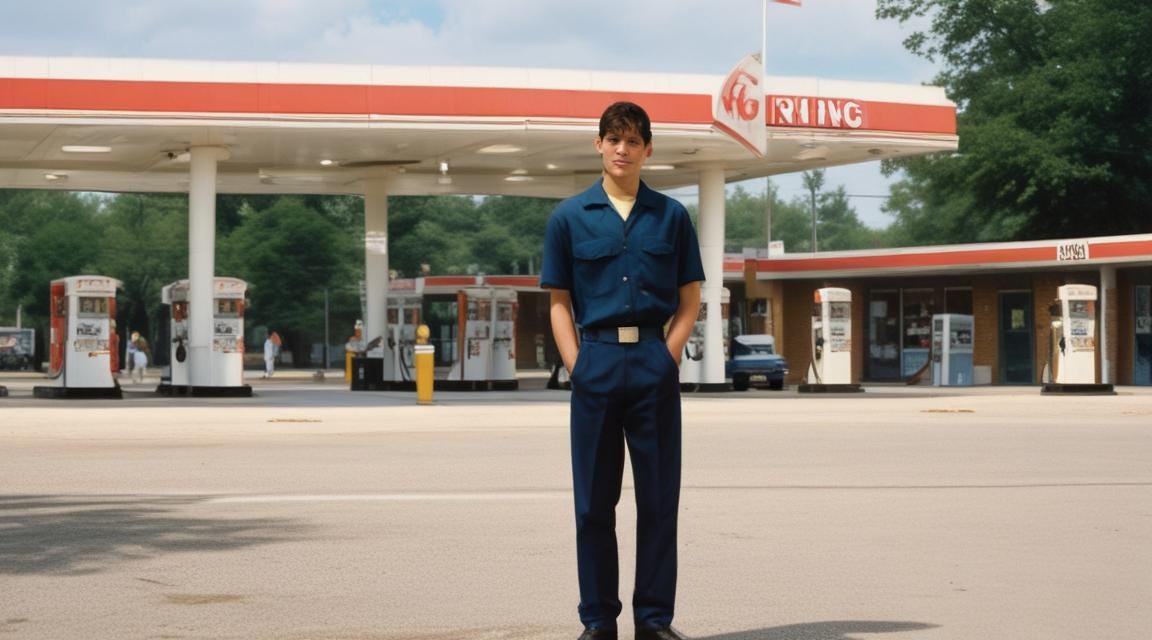
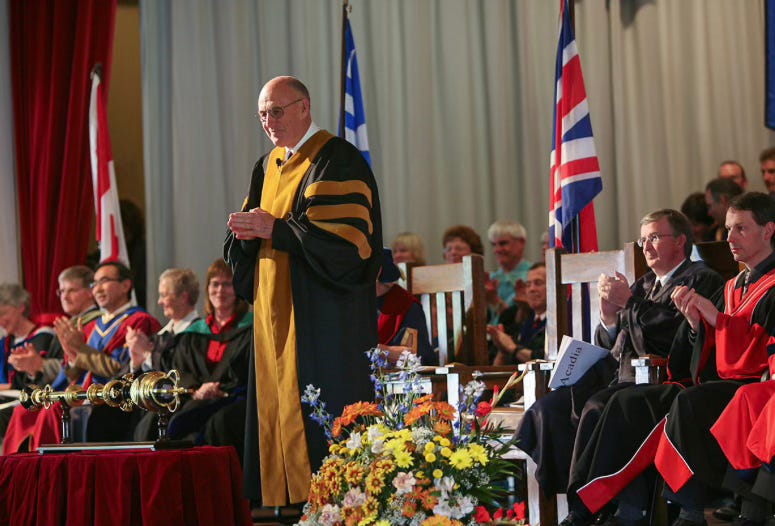
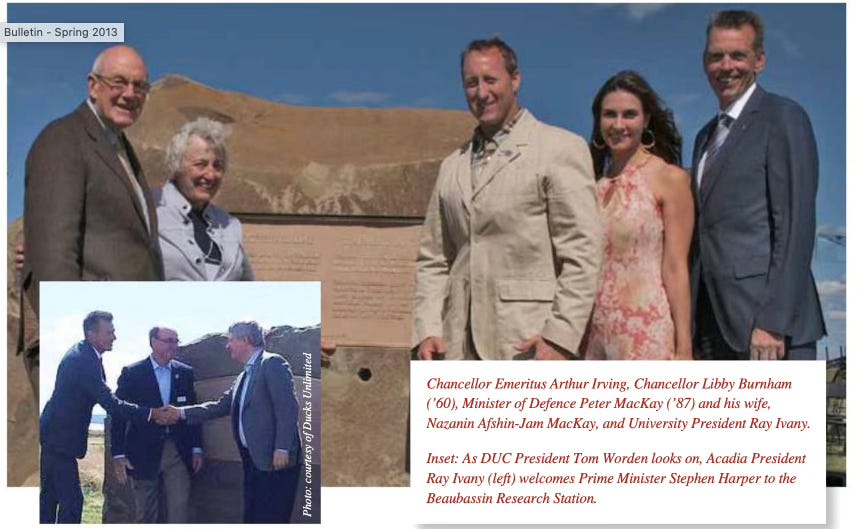
Lovely. Thanks Paul.